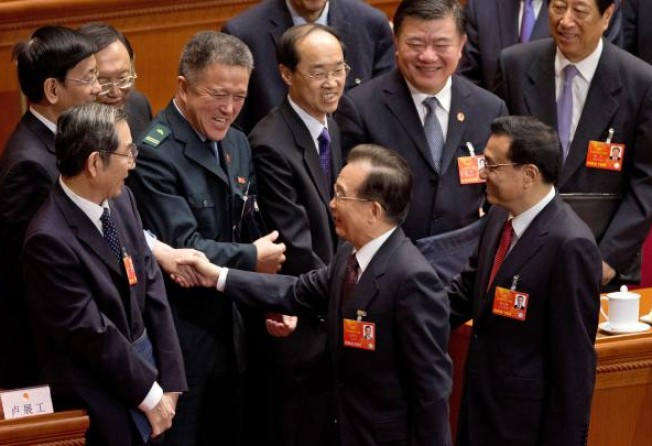Wen Jiabao bows out after 10 years as premier

Wen Jiabao bowed out of political life yesterday, formally handing the premiership to Li Keqiang after 10 years in the job.
Li became the new premier after a ceremonial election at the rubber-stamp National People’s Congress, being chosen by 2,940 deputies and opposed by only three.
After Li’s appointment was announced, Wen shook hands and chatted with more than a dozen people on his way out, including Li and new president Xi Jinping.
Dr Zhong Nanshan, a leading health expert and environmental critic, also bade him farewell.
Analysts said Wen had made his mark on history as a caring leader, but also blamed him for failing to keep property prices in check and preventing the income gap from widening.
During his reign, Wen nurtured an image as a compassionate official who sympathised with the poor, earning the nickname “Grandpa Wen”.
He grabbed headlines for eating dumplings with miners and migrant workers and was often the first top official to arrive at the scene of a disaster to comfort weeping victims.
Analysts also said Wen should be credited with abolishing the thousand-year-old agricultural tax and providing public health insurance for farmers.
But even though his courage to call for political reform amid a conservative mainstream political culture earned him respect, analysts said it also showed him to be a weak leader who lacked the ability and power to even start reforms during his time in office.
Zhang Lifan, a historian formerly with the Chinese Academy of Social Sciences, said Wen’s 4 trillion yuan (HK$4.9 trillion) stimulus plan, introduced in response to the global downturn in late 2008, had benefited state-owned enterprises and government departments rather than ordinary people.
It had also contributed towards worsening income inequality and an overheating property market.
By repeatedly calling for political reform and not being able to implement real changes, Zhang said Wen gave the impression of being a tragic figure, passionate in his beliefs but powerless in the face of an inert and corrupt regime.
“He gave the impression that, ‘I want to push reform but they won’t allow me’ … to fuzz over his other inadequacies,” Zhang said.
Zhang said that while Wen had liberal leanings, his lack of political clout in an environment that depended on connections and lineage meant he did not have enough power to implement the necessary reforms.
Wen, an aide to late reformist leader Zhao Ziyang, accompanied his boss when he went to visit students in Tiananmen Square during the 1989 pro-democracy movement.
Zhao was later purged for his sympathy for the students.
Chen Ziming, an independent political analyst, said Wen’s remarks on political 8reform had set him apart from other top leaders.
A year ago, at the closing of the annual session of the National People’s Congress, Wen warned the country could plunge back into a tragedy like the Cultural Revolution if it did not carry out political reform.
“While others were saying, ‘Hold back!’, he was saying, ‘Reform!’” Chen said.